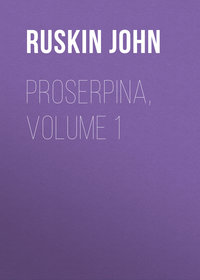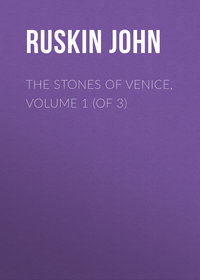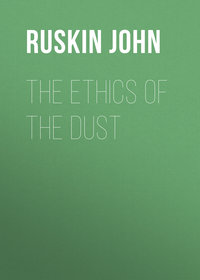
The Pleasures of England
Hitherto I have read to you with only supplemental comment. But in the next following passage, with which I close my series of extracts, sentence after sentence occurs, at which as I read, I must raise my hand, to mark it for following deprecation, or denial.
"In the centre of Westminster Abbey thus lies its Founder, and such is the story of its foundation. Even apart from the legendary elements in which it is involved, it is impossible not to be struck by the fantastic character of all its circumstances. We seem to be in a world of poetry." (I protest, No.) "Edward is four centuries later than Ethelbert and Augustine; but the origin of Canterbury is commonplace and prosaic compared with the origin of Westminster." (Yes, that's true.) "We can hardly imagine a figure more incongruous to the soberness of later times than the quaint, irresolute, wayward prince whose chief characteristics have just been described. His titles of Confessor and Saint belong not to the general instincts of Christendom but to the most transitory feelings of the age." (I protest, No.) "His opinions, his prevailing motives, were such as in no part of modern Europe would now be shared by any educated teacher or ruler." (That's true enough.) "But in spite of these irreconcilable differences, there was a solid ground for the charm which he exercised over his contemporaries. His childish and eccentric fancies have passed away;" (I protest, No;) "but his innocent faith and his sympathy with his people are qualities which, even in our altered times, may still retain their place in the economy of the world. Westminster Abbey, so we hear it said, sometimes with a cynical sneer, sometimes with a timorous scruple, has admitted within its walls many who have been great without being good, noble with a nobleness of the earth earthy, worldly with the wisdom of this world. But it is a counterbalancing reflection, that the central tomb, round which all those famous names have clustered, contains the ashes of one who, weak and erring as he was, rests his claims of interment here, not on any act of power or fame, but only on his artless piety and simple goodness. He, towards whose dust was attracted the fierce Norman, and the proud Plantagenet, and the grasping Tudor, and the fickle Stuart, even the Independent Oliver, the Dutch William, and the Hanoverian George, was one whose humble graces are within the reach of every man, woman, and child of every time, if we rightly part the immortal substance from the perishable form."
Now I have read you these passages from Dean Stanley as the most accurately investigatory, the most generously sympathetic, the most reverently acceptant account of these days, and their people, which you can yet find in any English history. But consider now, point by point, where it leaves you. You are told, first, that you are living in an age of poetry. But the days of poetry are those of Shakespeare and Milton, not of Bede: nay, for their especial wealth in melodious theology and beautifully rhythmic and pathetic meditation, perhaps the days which have given us 'Hiawatha,' 'In Memoriam,' 'The Christian Year,' and the 'Soul's Diary' of George Macdonald, may be not with disgrace compared with those of Caedmon. And nothing can be farther different from the temper, nothing less conscious of the effort, of a poet, than any finally authentic document to which you can be referred for the relation of a Saxon miracle.
I will read you, for a perfectly typical example, an account of one from Bede's 'Life of St. Cuthbert,' The passage is a favourite one of my own, but I do not in the least anticipate its producing upon you the solemnizing effect which I think I could command from reading, instead, a piece of 'Marmion,' 'Manfred,' or 'Childe Harold.'
"He had one day left his cell to give advice to some visitors; and when he had finished, he said to them, 'I must now go in again, but do you, as you are inclined to depart, first take food; and when you have cooked and eaten that goose which is hanging on the wall, go on board your vessel in God's name and return home.' He then uttered a prayer, and, having blessed them, went in. But they, as he had bidden them, took some food; but having enough provisions of their own, which they had brought with them, they did not touch the goose.
"But when they had refreshed themselves they tried to go on board their vessel, but a sudden storm utterly prevented them from putting to sea. They were thus detained seven days in the island by the roughness of the waves, and yet they could not call to mind what fault they had committed. They therefore returned to have an interview with the holy father, and to lament to him their detention. He exhorted them to be patient, and on the seventh day came out to console their sorrow, and to give them pious exhortations. When, however, he had entered the house in which they were stopping, and saw that the goose was not eaten, he reproved their disobedience with mild countenance and in gentle language: 'Have you not left the goose still hanging in its place? What wonder is it that the storm has prevented your departure? Put it immediately into the caldron, and boil and eat it, that the sea may become tranquil, and you may return home.'
"They immediately did as he commanded; and it happened most wonderfully that the moment the kettle began to boil the wind began to cease, and the waves to be still Having finished their repast, and seeing that the sea was calm, they went on board, and to their great delight, though with shame for their neglect, reached home with a fair wind. Now this, as I have related, I did not pick up from any chance authority, but I had it from one of those who were present, a most reverend monk and priest of the same monastery, Cynemund, who still lives, known to many in the neighbourhood for his years and the purity of his life."
I hope that the memory of this story, which, thinking it myself an extremely pretty one, I have given you, not only for a type of sincerity and simplicity, but for an illustration of obedience, may at all events quit you, for good and all, of the notion that the believers and witnesses of miracle were poetical persons. Saying no more on the head of that allegation, I proceed to the Dean's second one, which I cannot but interpret as also intended to be injurious,—that they were artless and childish ones; and that because of this rudeness and puerility, their motives and opinions would not be shared by any statesmen of the present day.
It is perfectly true that Edward the Confessor was himself in many respects of really childish temperament; not therefore, perhaps, as I before suggested to you, less venerable. But the age of which we are examining the progress, was by no means represented or governed by men of similar disposition. It was eminently productive of—it was altogether governed, guided, and instructed by—men of the widest and most brilliant faculties, whether constructive or speculative, that the world till then had seen; men whose acts became the romance, whose thoughts the wisdom, and whose arts the treasure, of a thousand years of futurity.
I warned you at the close of last lecture against the too agreeable vanity of supposing that the Evangelization of the world began at St. Martin's, Canterbury. Again and again you will indeed find the stream of the Gospel contracting itself into narrow channels, and appearing, after long-concealed filtration, through veins of unmeasured rock, with the bright resilience of a mountain spring. But you will find it the only candid, and therefore the only wise, way of research, to look in each era of Christendom for the minds of culminating power in all its brotherhood of nations; and, careless of local impulse, momentary zeal, picturesque incident, or vaunted miracle, to fasten your attention upon the force of character in the men, whom, over each newly-converted race, Heaven visibly sets for its shepherds and kings, to bring forth judgment unto victory. Of these I will name to you, as messengers of God and masters of men, five monks and five kings; in whose arms during the range of swiftly gainful centuries which we are following, the life of the world lay as a nursling babe. Remember, in their successive order,—of monks, St. Jerome, St. Augustine, St. Martin, St. Benedict, and St. Gregory; of kings,—and your national vanity may be surely enough appeased in recognizing two of them for Saxon,—Theodoric, Charlemagne, Alfred, Canute, and the Confessor. I will read three passages to you, out of the literal words of three of these ten men, without saying whose they are, that you may compare them with the best and most exalted you have read expressing the philosophy, the religion, and the policy of to-day,—from which I admit, with Dean Stanley, but with a far different meaning from his, that they are indeed separate for evermore. I give you first, for an example of Philosophy, a single sentence, containing all—so far as I can myself discern—that it is possible for us to know, or well for us to believe, respecting the world and its laws.
"OF GOD'S UNIVERSAL PROVIDENCE, RULING ALL, AND COMPRISING ALL.
"Wherefore the great and mighty God; He that made man a reasonable creature of soul and body, and He that did neither let him pass unpunished for his sin, nor yet excluded him from mercy; He that gave, both unto good and bad, essence with the stones, power of production with the trees, senses with the beasts of the field, and understanding with the angels; He from whom is all being, beauty, form, and number, weight, and measure; He from whom all nature, mean and excellent, all seeds of form, all forms of seed, all motion, both of forms and seeds, derive and have being; He that gave flesh the original beauty, strength, propagation, form and shape, health and symmetry; He that gave the unreasonable soul, sense, memory, and appetite; the reasonable, besides these, fantasy, understanding, and will; He, I say, having left neither heaven, nor earth, nor angel, nor man, no, nor the most base and contemptible creature, neither the bird's feather, nor the herb's flower, nor the tree's leaf, without the true harmony of their parts, and peaceful concord of composition:—It is in no way credible that He would leave the kingdoms of men and their bondages and freedom loose and uncomprised in the laws of His eternal providence."5
This for the philosophy.6 Next, I take for example of the Religion of our ancestors, a prayer, personally and passionately offered to the Deity conceived as you have this moment heard.
"O Thou who art the Father of that Son which has awakened us, and yet urgeth us out of the sleep of our sins, and exhorteth us that we become Thine;" (note you that, for apprehension of what Redemption means, against your base and cowardly modern notion of 'scaping whipping. Not to take away the Punishment of Sin, but by His Resurrection to raise us out of the sleep of sin itself! Compare the legend at the feet of the Lion of the Tribe of Judah in the golden Gospel of Charles le Chauve7:—
"HIC LEO SURGENDO PORTAS CONFREGIT AVERNI QUI NUNQUAM DORMIT, NUSQUAM DORMITAT IN ÆVUM;")
"to Thee, Lord, I pray, who art the supreme truth; for all the truth that is, is truth from Thee. Thee I implore, O Lord, who art the highest wisdom. Through Thee are wise all those that are so. Thou art the true life, and through Thee are living all those that are so. Thou art the supreme felicity, and from Thee all have become happy that are so. Thou art the highest good, and from Thee all beauty springs. Thou art the intellectual light, and from Thee man derives his understanding.
"To Thee, O God, I call and speak. Hear, O hear me, Lord! for Thou art my God and my Lord; my Father and my Creator; my ruler and my hope; my wealth and my honour my house, my country, my salvation, and my life! Hear, hear me, O Lord! Few of Thy servants comprehend Thee. But Thee alone I love,8 indeed, above all other things. Thee I seek: Thee I will follow: Thee I am ready to serve. Under Thy power I desire to abide, for Thou alone art the Sovereign of all. I pray Thee to command me as Thou wilt."
You see this prayer is simply the expansion of that clause of the Lord's Prayer which most men eagerly omit from it,—Fiat voluntas tua. In being so, it sums the Christian prayer of all ages. See now, in the third place, how far this king's letter I am going to read to you sums also Christian Policy.
"Wherefore I render high thanks to Almighty God, for the happy accomplishment of all the desires which I have set before me, and for the satisfying of my every wish.
"Now therefore, be it known to you all, that to Almighty God Himself I have, on my knees, devoted my life, to the end that in all things I may do justice, and with justice and rightness rule the kingdoms and peoples under me; throughout everything preserving an impartial judgment. If, heretofore, I have, through being, as young men are, impulsive or careless, done anything unjust, I mean, with God's help, to lose no time in remedying my fault. To which end I call to witness my counsellors, to whom I have entrusted the counsels of the kingdom, and I charge them that by no means, be it through fear of me, or the favour of any other powerful personage, to consent to any injustice, or to suffer any to shoot out in any part of my kingdom. I charge all my viscounts and those set over my whole kingdom, as they wish to keep my friendship or their own safety, to use no unjust force to any man, rich or poor; let all men, noble and not noble, rich and poor alike, be able to obtain their rights under the law's justice; and from that law let there be no deviation, either to favour the king or any powerful person, nor to raise money for me. I have no need of money raised by what is unfair. I also would have you know that I go now to make peace and firm treaty by the counsels of all my subjects, with those nations and people who wished, had it been possible for them to do so, which it was not, to deprive us alike of kingdom and of life. God brought down their strength to nought: and may He of His benign love preserve us on our throne and in honour. Lastly, when I have made peace with the neighbouring nations, and settled and pacified all my dominions in the East, so that we may nowhere have any war or enmity to fear, I mean to come to England this summer, as soon as I can fit out vessels to sail. My reason, however, in sending this letter first is to let all the people of my kingdom share in the joy of my welfare: for as you yourselves know, I have never spared myself or my labour; nor will I ever do so, where my people are really in want of some good that I can do them."
What think you now, in candour and honour, you youth of the latter days,—what think you of these types of the thought, devotion, and government, which not in words, but pregnant and perpetual fact, animated these which you have been accustomed to call the Dark Ages?
The Philosophy is Augustine's; the Prayer Alfred's; and the Letter Canute's.
And, whatever you may feel respecting the beauty or wisdom of these sayings, be assured of one thing above all, that they are sincere; and of another, less often observed, that they are joyful.
Be assured, in the first place, that they are sincere, The ideas of diplomacy and priestcraft are of recent times. No false knight or lying priest ever prospered, I believe, in any age, but certainly not in the dark ones. Men prospered then, only in following openly-declared purposes, and preaching candidly beloved and trusted creeds.
And that they did so prosper, in the degree in which they accepted and proclaimed the Christian Gospel, may be seen by any of you in your historical reading, however partial, if only you will admit the idea that it could be so, and was likely to be so. You are all of you in the habit of supposing that temporal prosperity is owing either to worldly chance or to worldly prudence; and is never granted in any visible relation to states of religious temper. Put that treacherous doubt away from you, with disdain; take for basis of reasoning the noble postulate, that the elements of Christian faith are sound,—instead of the base one, that they are deceptive; reread the great story of the world in that light, and see what a vividly real, yet miraculous tenor, it will then bear to you.
Their faith then, I tell you first, was sincere; I tell you secondly that it was, in a degree few of us can now conceive, joyful. We continually hear of the trials, sometimes of the victories, of Faith,—but scarcely ever of its pleasures. Whereas, at this time, you will find that the chief delight of all good men was in the recognition of the goodness and wisdom of the Master, who had come to dwell with them upon earth. It is almost impossible for you to conceive the vividness of this sense in them; it is totally impossible for you to conceive the comfort, peace, and force of it. In everything that you now do or seek, you expose yourselves to countless miseries of shame and disappointment, because in your doing you depend on nothing but your own powers, and in seeking choose only your own gratification. You cannot for the most part conceive of any work but for your own interests, or the interests of others about whom you are anxious in the same faithless way; everything about which passion is excited in you or skill exerted is some object of material life, and the idea of doing anything except for your own praise or profit has narrowed itself into little more than the precentor's invitation to the company with little voice and less practice to "sing to the praise and glory of God."
I have said that you cannot imagine the feeling of the energy of daily life applied in the real meaning of those words. You cannot imagine it, but you can prove it. Are any of you willing, simply as a philosophical experiment in the greatest of sciences, to adopt the principles and feelings of these men of a thousand years ago for a given time, say for a year? It cannot possibly do you any harm to try, and you cannot possibly learn what is true in these things, without trying. If after a year's experience of such method you find yourself no happier than before, at least you will be able to support your present opinions at once with more grace and more modesty; having conceded the trial it asked for, to the opposite side. Nor in acting temporarily on a faith you do not see to be reasonable, do you compromise your own integrity more, than in conducting, under a chemist's directions, an experiment of which he foretells inexplicable consequences. And you need not doubt the power you possess over your own minds to do this. Were faith not voluntary, it could not be praised, and would not be rewarded.
If you are minded thus to try, begin each day with Alfred's prayer,—fiat voluntas tua; resolving that you will stand to it, and that nothing that happens in the course of the day shall displease you. Then set to any work you have in hand with the sifted and purified resolution that ambition shall not mix with it, nor love of gain, nor desire of pleasure more than is appointed for you; and that no anxiety shall touch you as to its issue, nor any impatience nor regret if it fail. Imagine that the thing is being done through you, not by you; that the good of it may never be known, but that at least, unless by your rebellion or foolishness, there can come no evil into it, nor wrong chance to it. Resolve also with steady industry to do what you can for the help of your country and its honour, and the honour of its God; and that you will not join hands in its iniquity, nor turn aside from its misery; and that in all you do and feel you will look frankly for the immediate help and direction, and to your own consciences, expressed approval, of God. Live thus, and believe, and with swiftness of answer proportioned to the frankness of the trust, most surely the God of hope will fill you with all joy and peace in believing.
But, if you will not do this, if you have not courage nor heart enough to break away the fetters of earth, and take up the sensual bed of it, and walk; if you say that you are bound to win this thing, and become the other thing, and that the wishes of your friends,—and the interests of your family,—and the bias of your genius,—and the expectations of your college,—and all the rest of the bow-wow-wow of the wild dog-world, must be attended to, whether you like it or no,—then, at least, for shame give up talk about being free or independent creatures; recognize yourselves for slaves in whom the thoughts are put in ward with their bodies, and their hearts manacled with their hands: and then at least also, for shame, if you refuse to believe that ever there were men who gave their souls to God,—know and confess how surely there are those who sell them to His adversary.
LECTURE III.
THE PLEASURES OF DEED
Alfred to Cœur de LionIt was my endeavour, in the preceding lecture, to vindicate the thoughts and arts of our Saxon ancestors from whatever scorn might lie couched under the terms applied to them by Dean Stanley,—'fantastic' and 'childish.' To-day my task must be carried forward, first, in asserting the grace in fantasy, and the force in infancy, of the English mind, before the Conquest, against the allegations contained in the final passage of Dean Stanley's description of the first founded Westminster; a passage which accepts and asserts, more distinctly than any other equally brief statement I have met with, the to my mind extremely disputable theory, that the Norman invasion was in every respect a sanitary, moral, and intellectual blessing to England, and that the arrow which slew her Harold was indeed the Arrow of the Lord's deliverance.
"The Abbey itself," says Dean Stanley,—"the chief work of the Confessor's life,—was the portent of the mighty future. When Harold stood beside his sister Edith, on the day of the dedication, and signed his name with hers as witness to the Charter of the Abbey, he might have seen that he was sealing his own doom, and preparing for his own destruction. The solid pillars, the ponderous arches, the huge edifice, with triple tower and sculptured stones and storied windows, that arose in the place and in the midst of the humble wooden churches and wattled tenements of the Saxon period, might have warned the nobles who were present that the days of their rule were numbered, and that the avenging, civilizing, stimulating hand of another and a mightier race was at work, which would change the whole face of their language, their manners, their Church, and their commonwealth. The Abbey, so far exceeding the demands of the dull and stagnant minds of our Anglo-Saxon ancestors, was founded not only in faith, but in hope: in the hope that England had yet a glorious career to run; that the line of her sovereigns would not be broken, even when the race of Alfred had ceased to reign."
There must surely be some among my hearers who are startled, if not offended, at being told in the terms which I emphasized in this sentence, that the minds of our Saxon fathers were, although fantastic, dull, and, although childish, stagnant; that farther, in their fantastic stagnation; they were savage,—and in their innocent dullness, criminal; so that the future character and fortune of the race depended on the critical advent of the didactic and disciplinarian Norman baron, at once to polish them, stimulate, and chastise.
Before I venture to say a word in distinct arrest of this judgment, I will give you a chart, as clear as the facts observed in the two previous lectures allow, of the state and prospects of the Saxons, when this violent benediction of conquest happened to them: and especially I would rescue, in the measure that justice bids, the memory even of their Pagan religion from the general scorn in which I used Carlyle's description of the idol of ancient Prussia as universally exponent of the temper of Northern devotion. That Triglaph, or Triglyph Idol, (derivation of Triglaph wholly unknown to me—I use Triglyph only for my own handiest epithet), last set up, on what is now St. Mary's hill in Brandenburg, in 1023, belonged indeed to a people wonderfully like the Saxons,—geographically their close neighbours,—in habits of life, and aspect of native land, scarcely distinguishable from them,—in Carlyle's words, a "strong-boned, iracund, herdsman and fisher people, highly averse to be interfered with, in their religion especially, and inhabiting a moory flat country, full of lakes and woods, but with plenty also of alluvial mud, grassy, frugiferous, apt for the plough"—in all things like the Saxons, except, as I read the matter, in that 'aversion to be interfered with' which you modern English think an especially Saxon character in you,—but which is, on the contrary, you will find on examination, by no means Saxon; but only Wendisch, Czech, Serbic, Sclavic,—other hard names I could easily find for it among the tribes of that vehemently heathen old Preussen—"resolutely worshipful of places of oak trees, of wooden or stone idols, of Bangputtis, Patkullos, and I know not what diabolic dumb blocks." Your English "dislike to be interfered with" is in absolute fellowship with these, but only gathers itself in its places of Stalks, or chimneys, instead of oak trees, round its idols of iron, instead of wood, diabolically vocal now; strident, and sibilant, instead of dumb.



![Stones of Venice [introductions]](/covers_200/34843654.jpg)





